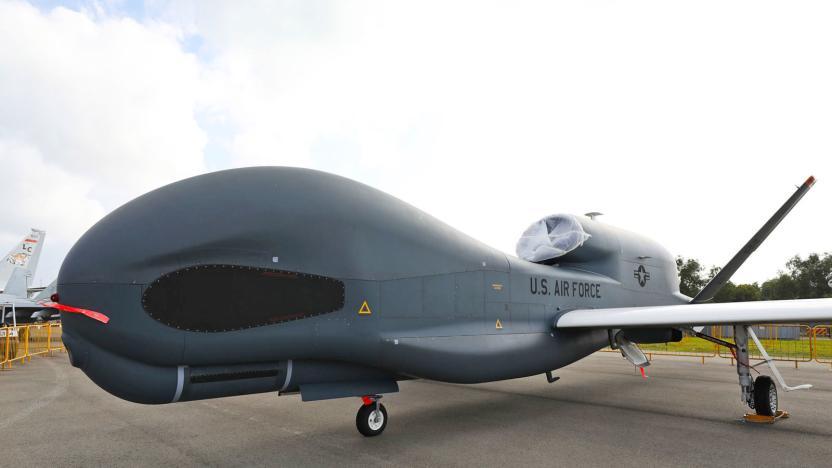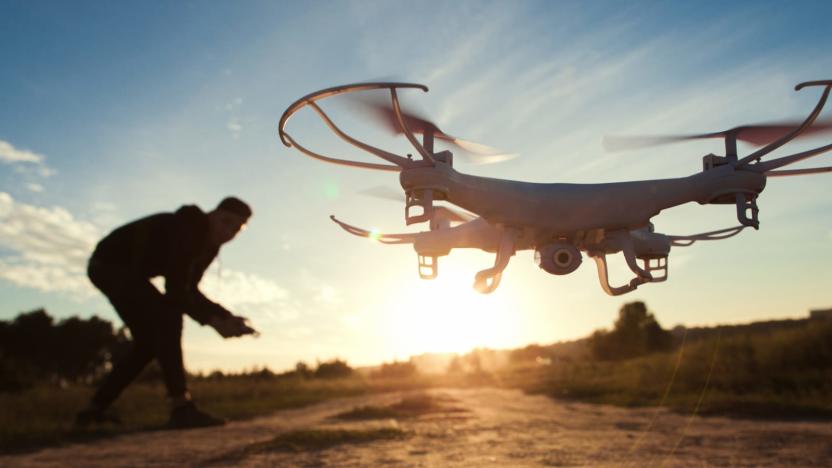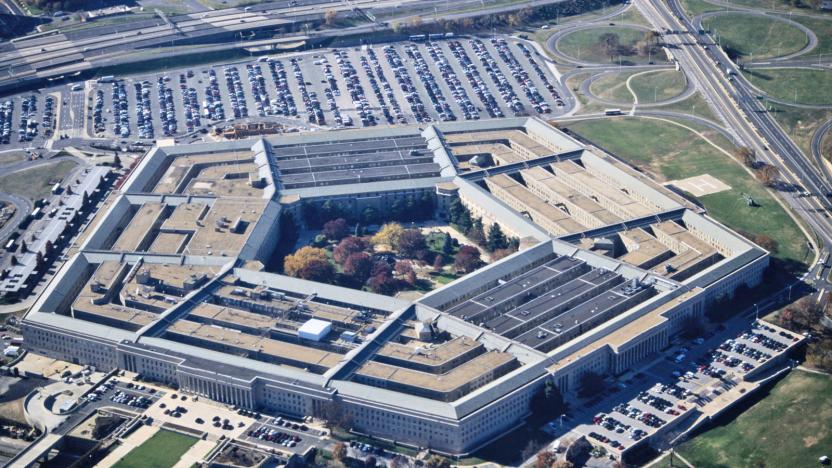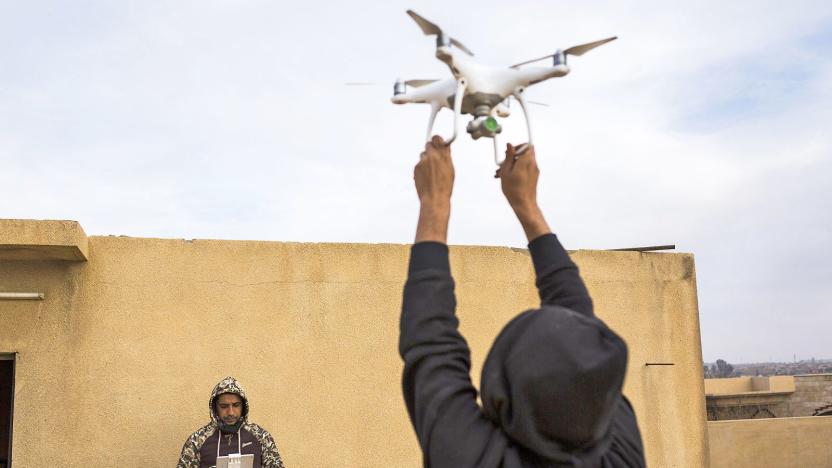Pentagon
Latest

Pentagon restricts use of location-logging fitness trackers
The Pentagon is banning soldiers and others stationed at sensitive bases and warzone areas from using location features on fitness trackers and other devices because the data could give away where troops are situated. The Department of Defense is not issuing an outright ban on GPS devices and apps, but declared that the location features must be turned off in certain areas.

US bill forces tech companies to disclose foreign software checks
Technology companies could soon be forced to reveal if they have allowed agencies in countries such as China and Russia to closely examine their software. The legislation -- part of the Pentagon's spending bill -- was drafted in response to a Reuters investigation last year which found that in order to sell to the Russian market, some software makers had allowed a Russian defense agency to hunt for vulnerabilities in software also used by some US government agencies.

Ex-Pentagon official behind Project Maven ‘alarmed’ by Google withdrawal
Project Maven -- the deal through which Google is providing the Pentagon with AI software that can flag drone images that require further human review -- has been a thorn in the company's side for months. Google employees have spoken out against the project and their opposition ultimately led to the company deciding not to renew the contract when it expires next year. Now, former Deputy Defense Secretary Robert Work, who started the Project Maven initiative, is saying he's "alarmed" by Google's decision to walk away from the program.

Trump directs Pentagon to form a Space Force military branch
It looks like the US could have a sixth military branch sometime in the future, one focused entirely on space. President Trump said during a National Space Council meeting today that he has called for the development of a Space Force, CNBC reports. "I am hereby directing the Department of Defense and Pentagon to immediately begin the process necessary to establish a Space Force as the sixth branch of the armed forces," he said. "Our destiny beyond the Earth is not only a matter of national identity but a matter of national security."

Google reportedly won’t renew its controversial military AI contract
The controversial government contract that led thousands of Google employees to sign a petition in opposition and dozens to quit in protest will not be renewed, Gizmodo reports. Project Maven has been billed by Google as a small, "non-offensive" deal through which it would provide open-source AI software to the Pentagon that could help the military flag drone images requiring further human review. But the project has been decried by many of the company's employees who believe it could hurt efforts to hold the public's trust and went against Google's "Don't Be Evil" motto.

Google says its military AI work will be guided by ethical principles
Google's Pentagon contract and its involvement with the military's Project Maven has stirred controversy both outside of and within the company. Its plan to provide AI technology that can help flag drone images for human review has led to an internal petition signed by thousands of employees who oppose the decision as well as a number of resignations. Now, the New York Times reports that Google is working on a set of guidelines aimed at steering the company's decisions regarding defense and intelligence contracts.

Google employees reportedly quit over military drone AI project
Around a dozen Google employees have quit over the company's involvement in an artificial intelligence drone program for the Pentagon called Project Maven, Gizmodo reported today. Meanwhile, nearly 4,000 workers have now demanded an end to the company's participation in Maven in a petition that also calls for Google to avoid military work in the future.

US elevates the role of Cyber Command
After months of talk and planning, US Cyber Command is now just as important as the rest of the Pentagon's commands -- at least, on paper. The military has officially elevated its cyberwarfare division to a "unified command" that operates independently of the NSA. It's not a complete split. General Paul Nakasone (shown above) will run both Cyber Command and the NSA, replacing Admiral Michael Rogers.

Pentagon bans Huawei, ZTE phones from military base retailers
The Pentagon has banned retailers on US military bases from selling Huawei and ZTE phones, the Wall Street Journal reported. Officials are concerned that the Chinese government could order the firms to track soldiers' movements or snoop on their communications, though Huawei and ZTE have both denied that could be the case.

Google employees petition CEO to drop out of Pentagon AI project
Over 3,100 Google employees have signed a petition opposing the company's part in a Pentagon AI program. The letter asked CEO Sundar Pichai to pull Google out of the project, which harnesses artificial intelligence to analyze video and could improve drone targeting. Further, it urged him to establish and enforce a policy that kept the company or its subsidiaries from ever building "warfare technology."

FDA approves blood test that determines severity of concussions
The FDA announced this week that it has approved a blood test that can quickly and reliably detect signs of a concussion. Typically, when someone seeks medical care following a head injury, they're subjected to a neurological test and/or a CT scan. However, CT scans can only detect bleeding or swelling in the brain, and for injuries that are more minor but still serious, those scans aren't terribly useful. Additionally, if CT scans don't spot anything, and in many cases they don't, the person undergoing the scan has been subjected to unnecessary radiation and, usually, an unneeded expense.

Pentagon reviews policy after fitness app reveals military locations
Yesterday, reports surfaced that a heat map released by fitness app company Strava showed the locations of US and other countries' military. While most of the locations spotted, including Afghanistan and Syria, are known to host US military bases, it still highlights the fact that information the Department of Defense would prefer remain under wraps could find its way out into the open. It also demonstrates that fitness apps could pose a security threat if location information isn't correctly handled. Now, Reuters reports, US Defense Secretary Jim Mattis has ordered a review of the situation.

Pentagon funded UFO identification program for 5 years
Recent UFO research isn't just the work of the X-Files or former pop punk stars. The New York Times has learned that the US Department of Defense quietly funded a program (Advanced Aerospace Threat Identification) designed to explain UFO reports. The program was initially funded in 2007 at the behest of Senator Harry Reid, and sent most of its money ($22 million per year) went to an aerospace firm run by his friend Robert Bigelow, who's "absolutely convinced" UFOs have visited Earth and has been making inflatable habitats for NASA. The money stopped flowing in 2012, but the program is technically active to this day.

Pentagon left public intelligence gathering data on exposed server
Even intelligence gatherers aren't immune to making mistakes that leave data wide open. Researchers at UpGuard have revealed that the US military's Central Command and Pacific Command left "at least" 1.8 billion collected internet posts exposed on a misconfigured Amazon Web Services S3 server. Some of the data goes as far back as 2009. There doesn't appear to be any private content in the mix, and it's not clear that malicious intruders accessed it before the Department of Defense locked things down on October 1st (after notification from UpGuard). However, the exposure still raises concerns about both the government's approach to security and the kind of information it's collecting.

HP Enterprise let Russia review the Pentagon's security software
Last year, Hewlett Packard Enterprise (HPE) allowed a Russian defense agency to analyze the source code of a cybersecurity software used by the Pentagon, Reuters reports. The software, a product called ArcSight, is an important piece of cyber defense for the Army, Air Force and Navy and works by alerting users to suspicious activity -- such as a high number of failed login attempts -- that might be a sign of an ongoing cyber attack. The review of the software was done by a company called Echelon for Russia's Federal Service for Technical and Export Control as HPE was seeking to sell the software in the country. While such reviews are common for outside companies looking to market these types of products in Russia, this one could have helped Russian officials find weaknesses in the software that could aid in attacks on US military cyber networks.

The military can shoot down drones that fly over bases
Drones can cost a pretty penny, so make sure not to fly them too near an airport... or a military base. The Pentagon has approved a new policy that gives military bases the right to shoot down or seize both private and commercial UAVs that encroach upon their airspace and are deemed a threat. While details about the policy remain classified, Pentagon spokesperson Navy Capt. Jeff Davis says the new guidance gives bases "the ability to take action to stop these threats (i.e. UAVs or drones) and that includes disabling, destroying and tracking [them]."

Pentagon officials can view classified material on special tablets
The Department of Defense (DOD) is testing out the use of tablets for viewing classified documents and videos. In a statement, the Defense Information Systems Agency said that the year-long pilot program would provide senior DOD leaders with 8-inch tablets, the first of which was given to the DOD's acting chief information officer, John Zangardi, in May.

Will we be able to control the killer robots of tomorrow?
From ship-hunting Tomahawk missiles and sub-spying drone ships to semi-autonomous UAV swarms and situationally-aware reconnaissance robots, the Pentagon has long sought to protect its human forces with the use of robotic weapons. But as these systems gain ever-greater degrees of intelligence and independence, their increasing autonomy has some critics worried that humans are ceding too much power to devices whose decision-making processes we don't fully understand (and which we may not be entirely able to control).

US military will finally start encrypting soldiers' emails
You'd think the military's email service mail.mil would be more secure than Gmail and other free alternatives, but that's apparently not the case. A Motherboard investigation in 2015 revealed that while it does have systems in place to protect classified messages, it doesn't even use STARTTLS -- a 15-year-old encryption technology that prevents emails from being intercepted in transit. That exposes unclassified emails to surveillance and leaves them vulnerable as they make their way to recipients. Now, after getting a lot of flak over the lack of security, Pentagon says it will finally start encrypting soldiers' emails... but not until July 2018.

The Pentagon is hunting ISIS using big data and machine learning
Military and civilian intelligence analysts "overwhelmed" by the sheer volume of video surveillance data recorded over the America's numerous military incursions against ISIS will soon get some relief. The Pentagon announced on Monday that it is tasking its newly-minted Algorithmic Warfare Cross Functional Team (AWCFT), dubbed Project Maven, with using big data and machine learning to accelerate the process of discovering actionable intelligence in all that aerial imagery.






